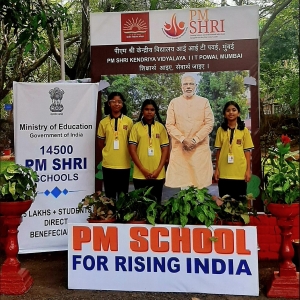
.png) Joseph Maliakan
Joseph Maliakan

The Union Education Ministry is using the Pradhan Mantri Schools for Rising India (PM-SHRI) fund to arm-twist states into accepting the controversial National Education Policy (NEP) 2020. The PM SHRI was introduced in 2022-23 and is to continue through 2026-27, that is, for five years.
According to the 'vision statement,' the scheme, launched on September 7, 2022, is intended to develop more than 14,500 PM-SHRI schools in which every student feels welcomed and cared for, where a safe and stimulating learning environment exists, where a wide range of learning experiences are offered, and where good physical infrastructure and appropriate resources conducive to learning are available to all students.
More than 20 lakh students were expected to be the direct beneficiaries of the scheme. It would nurture students in a way that they become engaged, productive and contributing citizens for building an equitable, inclusive and plural society, "as envisaged by the National Education Policy 2020."
These schools would help showcase the implementation of the National Education Policy 2020 and emerge as exemplars. The school's dignity as an institution would be restored, and important dates, such as the school's foundation day, would be celebrated with the community. The list of distinguished alumni would be displayed and honoured.
The schools would focus not only on enhancing cognitive development but also on creating holistic, well-rounded individuals equipped with key 21st-century skills. The focus would be on each child's learning outcomes in every grade. Assessment at all levels would be based on conceptual understanding, the application of knowledge to real-life situations, and competency.
When the scheme was announced by the Union Education Ministry in September the opposition ruled states, Kerala, Tamil Nadu, West Bengal, Punjab and Delhi refused to implement it because acceptance of the scheme involved two things, first agreeing to enforce the provisions of the controversial National Education Policy 2020 arbitrarily formulated by the Union Education Ministry without due consultation with the states or discussion in the Parliament. Second, schools selected under the scheme were required to prominently display the PM-SHRI logo.
Education, as is well known, is a subject in the Concurrent list. While the states are free to legislate on education in accordance with the regional needs and aspirations of the people, any legislation on education enacted by the Union government will have to be passed fairly after consultations with the state governments and the various political parties represented in Parliament.
Most opposition parties opposed several provisions of the National Education Policy 2020, announced at the peak of COVID-19, without any consultation with the states or other stakeholders.
When the NEP 2020 was announced, opposition parties like the Trinamool Congress (TMC) and the Communist Party of India (Marxist) (CPM) opposed it on the grounds that it violated the fundamental values enshrined in the constitution, such as secularism, democracy, and socialism. The CPM had particularly opposed the NEP 2020, arguing that it would lead to the commercialisation and privatisation of education in the country, thereby further alienating and marginalising the poor.
The opposition also argued that the emphasis in the NEP 202 on ancient Indian knowledge systems will adversely affect scientific thinking among the new generation and encourage students to believe in superstitions and myths. The proposal to do away with the study of the Mughal period in Indian history would erase almost 400 years of Indian history, as various historians have pointed out.
Introduction of the PM-SHRI in state schools would lead to further centralisation of education. Ultimately, the Union government would have complete control over education, including the selection of textbooks, the appointment of teachers, the formulation of syllabi, and the holding of examinations. All would be controlled and managed by the Union Education Ministry or other Central organisations under its purview. This will, as already witnessed in BJP-ruled states, further distort history, as textbooks have been arbitrarily changed.
Under the scheme, 14,500 schools across the country are to be brought under it over the five years from 2021-22 to 2025-26: 13,070 Government schools, 913 Kendriya Vidyalaya Sangathan schools, and 620 Navodaya Vidyalaya Samiti schools.
Despite earlier opposition, the Kerala government on Thursday, October 23, signed a memorandum of understanding (MoU) with the Union government for the PM-SHRI. The decision came notwithstanding opposition from the Communist Party of India (CPI), the second-largest partner in the opposition alliance.
The change of heart came following the withholding of ?1500 crore under the Samagra Shiksha Keralam (SSK) by the Union government, it is learnt. Following the signing of the MoU under PM SHRI, the money will be released to Kerala!
Other opposition-ruled states, like Tamil Nadu and West Bengal, however, have refused to accept the PM-SHRI and the NEP even in the face of financial arm-twisting by the Union Government. The Union government has withheld ?10,447 crores meant for Tamil Nadu between 2018 and 2024. The Union government has also withheld ?1,745 crores meant for West Bengal for just one year, 2024-25, for not accepting the PM-SHRI!